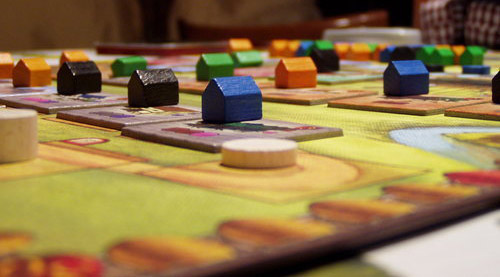
Caylus
2-5
12+
90+
In this game, the players act as building supervisors whose mission is to build a new castle for King Philip the Fair. To accomplish this, they’ll have to manage well their money, the available resources and above all else develop the economy of the little village which extends to the foot of the building site. Of course, the royal agents – the bailiff and the provost – keep a watchful eye on the progress of the work!

image © Ystari Games
User Reviews (6)
Add a Review for "Caylus"
You must be logged in to add a review.


In Caylus the players impersonate master builders commanding their building teams. Their ultimate goal is to construct a castle. But to do so they have to develop a town around the construction site. The game wonderfully simulates the town growth: it starts as a settlement with a few workshops. Then the center changes to be a residential area and finally it holds large prestigious buildings and monuments. At the same time new production areas appear on the suburbs.
The game mechanics is driven by worker placement and resource management. As the players construct new workshops and resource providing areas they may later use them. One can use a property of any player, but using a workshop of an opponent gives prestige (victory points) to the respective owner.
The game is rather complicated; there are a lot of things that limit the players and should be balanced by them each turn:
– The number of workers in the team is limited so is the number of possible actions.
– The workers need to be paid, so money is essential.
– Most of places the workers can perform their action can only hold one worker a turn, so timing is important.
– Successful working for the king earns royal favors – special bonuses which become more and more beneficial as the game progresses, while working in the town helps develop the production base.
– Suburban areas may be most productive, but there’s a chance they won’t be allowed by the royal officers to work in a given turn, so placing workers there is risky.
The only randomization in the game is the starting setup. There is 6!=120 ways the six starting tiles can be placed. As the tiles produce goods in order they are positioned it makes the games slightly different. But then it’s all the matter of flexible strategies of the players.
Caylus can be played by 2-5 players. I recommend 3 or 4 ones. For two players it has too little interaction, for 5 it’s somewhat too unpredictable and quite long.
The game is dangerously close to the perfect game I can imagine. Two drawbacks I can see can both be overcome. First: after a few plays you may notice that you want more interaction between players. You may then try the “Free Market” variant described in the tips section. Second: the graphical layout is not too appealing. But there exists the Premium Limited Edition of Caylus with new stunningly beautiful artwork and layout designed by Mike Doyle, as well as real metal coins added for more flavor.
From the time of its release Caylus is my top one game ant it won’t be easy to dethrone it.
Caylus is the best resource management game I know. Resources are always tight, so you have to think carefully to make the most of them, but it doesn’t get bogged down in calculations. The competitive worker placement forces you constantly reconsider and reprioritize, and the provost(which lets you deny your opponents their actions if they get too greedy) adds even more tension to this already tight game. The balance is excellent, with even turn order under your control. There is no randomness past the initial set-up, so there is nothing to undermine the strategy.
Like any game with little to no luck, the tactics in Caylus are unforgiving, with no room for error. But it is not just number-cruncing: there is subtlety in deciding when and where to push. Part of the key seems to be moderation – it is important to build as much as possible each turn, but at the same pushing too hard for one great turn is usually a mistake. You have to be careful not to overextend yourself. Also, while in the end the game is about points, in the meantime it is really about resources: gaining a resource advantage over your opponent and using it to scare them out of the castle.
Caylus does have a couple of minor disadvantages – it is a little long, it can be a little dry, there isn’t a whole lot of opportunity to form long-term strategies, and I wish that the favor tracks were more balanced. Overall, though, Caylus is a fascinating resource management game that really makes you think hard about every move.
Caylus works great with 2-players, and that is how I have mostly played it: 2-player with my wife. Some feel that is weaker with more players (although others prefer it that way); the few muliplayer games of it I have played also seemed like a lot of fun. In particular, the provost can become much more active with more players, so you really have to watch the way the mood is swinging that turn.
Play-length is a little bit on the long side – even as experienced players, a 2-player game takes us 1.5-2 hours, and with more or newer players it is more like 2-3 hours. More than that, it feels intense and draining the whole way. It’s not something to pull out unless you are up for the experience. But if you are up to it: wow, what an experience!
Caylus was one of the first modern board games I played (along with Puerto Rico and Power Grid). A few years have passed. I joined local gaming club. Played many, many, many games. And it still is my favorite game.
It has its flaws. The artwork could be better, stone resource production buildings could use a nerf, resource track could use a buff, but it still is the best…
Many games use worker placement mechanics, but they lack provost – this little guy who tells what works and what doesn’t brings interaction to the new level and does it perfectly – the fight for resources is brutal, but at the same time clever placement will let you benefit no matter how it ends. If you place correctly harming you will be bound to harming other players, brilliant idea. Why aren’t new worker placement games like that – loads of interaction but relatively little chaos. Even with 5 players its not that easy to bash clever leader and with experienced players there is so much control.
It is brutal fight for every point you can get, so the game really shines with competitive players of similar skill. (when you don’t try your best to get points the game will become boring) There are many rules and some mechanics are not that easy to grasp so you’ll probably need to play more than once to appreciate this game.
But I still don’t know of any better game… and i would really like to see one.
That’s right, Agricola has to take a step back and make room for the real king of strategy/resource management games.
I’m not gonna lie, it’s a tough game to learn at first, but the rewards of learning the game are great, as a new element is added to the traditional building/resource gathering that I’ve never seen before: the provost.
What is the provost? The overseer of construction, which adds a very realistic element to the game: a manager to oversee your work. Everyone can influence him with money to either pull back or move ahead, which can halt your work, making all your efforts and investments worthless for the turn!
This results in a VERY cutthroat strategy game, that I have grown to absolutely love. A must have for any true strategy game fan!
Theme is non-existent and extremely boring. Mechanics are nice. Moving of provost and bailiff interesting. Has almost zero luck. (Red buildings at the beginning of the game are random.)
Learning the rules took forever and the rulebook doesn’t explain the rules that well.(For example who gets to use the favor first.)
Game is over complicated and seems like a chore. It can drag on forever and is prone to analysis-paralysis. It gets progressively worse with more players cause the placing of provost is hard to predict.
Many don’t like it, but those who do, love it!
Caylus brought us the “worker placement” mechanic, back stabbing strategies applied to eurogaming and castle building thematics. It still stands as one of my favourites…